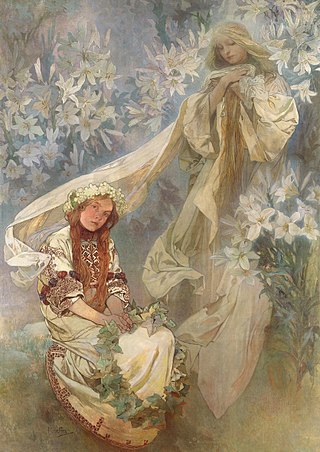
Maeve, Maev or Maiv is a female given name of Irish origin. It comes from the Irish name Méabh, which was spelt Meadhbh in early modern Irish, Meḋḃ or Meaḋḃ in Middle Irish, and Medb in Old Irish. It may derive from a word meaning "she who intoxicates", "mead-woman", or alternatively "she who rules". Medb is a queen in Irish mythology who is thought to have originally been a sovereignty goddess.

Tabitha is an English feminine given name, originating with Saint Tabitha, mentioned in the New Testament.
Edith is a feminine given name derived from the Old English word ēad, meaning wealth or prosperity, in combination with the Old English gȳð, meaning strife, and is in common usage in this form in English, German, many Scandinavian languages and Dutch. Its French form is Édith. Contractions and variations of this name include Ditte, Dita, and Edie.

Samantha is a feminine given name.

Florence is an androgynous French and English given name. It is derived from the French version of (Saint) Florentia, a Roman martyr under Diocletian. The Latin florens, florentius means "blossoming", verb floreo, meaning "I blossom / I flower / I flourish". Florence was in the past also used as a translation of the Latin version Florentius, and may be used in this context as a male given name.

Angela is a female given name. It is derived from the Greek word ángelos (ἄγγελος), meaning angel from Greek mythology. In the United States, the name "Angela" was at its most popular between 1965 and 1979, when it was ranked among the top 10 names for girls. Between 1922 and 2021, in the United States, the name was ranked in the top 35 names for girls.

Bridget is an Irish female name derived from the Gaelic noun brígh, meaning "power, strength, vigor, virtue". An alternate meaning of the name is "exalted one". Its popularity, especially in Ireland, is largely related to the popularity of Saint Brigid of Kildare, who was so popular in Ireland she was known as "Mary of the Gael". This saint took on many of the characteristics of the early Celtic goddess Brigid, who was the goddess of agriculture and healing and possibly also of poetry and fire. One of her epithets was "Brigid of the Holy Fire". In German and Scandinavian countries, the popularity of the name spread due to Saint Bridget of Sweden.
Rosie is a feminine given name of English origin. It is a diminutive form of the English language given name Rose, which is of Latin origin. Similar diminutives in other languages include: Rosa becoming Rosita in Spanish, and Ruža becoming Ružica in Slavic languages. Rosie is a nickname for names such as Rosalie, Rosemary, Roseanne, Rosalyn, Rosanna, and more. It is occasionally a male nickname, primarily a short form of Roosevelt.

Lily is a feminine given name usually derived from lily, the flower. The name became particularly popular along with other flower names for girls during the 1800s and early 1900s. The lily also has associations with and has been symbolic of innocence and purity in Christian art. Names beginning with or containing the letter L have also been particularly fashionable for girls. It is also occasionally used as a diminutive for other names such as Elizabeth.

Ruth is a common female given name, noted from Ruth, the eponymous heroine of the eighth book of the Old Testament.
Honor is a primarily feminine given name derived from the word "honour", taken from a Latin root word honos, honoris. It was a virtue name in use by the Puritans. It is still in occasional use in England, but is an extremely rare name in the United States, where it has never ranked among the top 1,000 names for girls or boys.

Kennedy is a unisex given name in the English language. The name is an Anglicised form of a masculine given name in the Irish language.

Shirley is a given name and a surname originating from the English place-name Shirley, which is derived from the Old English elements scire ("shire") or scīr and lēah. The name makes reference to the open space where the moot was held. The surname Shirley became established as a female given name in 1849 due to its use in Charlotte Brontë's novel Shirley, in which the character explains that her parents had intended the family surname for a son. It was further popularized in 1851–52 by its pseudonymous use by California Gold Rush writer Louise Amelia Knapp Smith Clappe. It was eventually brought to its highest popularity, in the 1930s, by the fame of child star Shirley Temple.

Ada is a feminine given name. One origin is the Germanic element "adel-" meaning "nobility", for example as part of the names Adelaide and Adeline. The name can also trace to a Hebrew origin, sometimes spelled Adah עָדָה, meaning "adornment". Ada means "first daughter" among the Igbo People. Its equivalent for "first son" in the same clan is Tahitii and Okpara across all Igbo ethnic group in Nigeria. The Igbo people are one of the largest ethnic groups in Africa. Ada means "island" in Turkish, and it was the 35th most popular girls' name in Turkey in 2016. Finally, the name occurs in Greek mythology and was in use in Ancient Greece.
Hope is a given name derived from the Middle English hope, ultimately from the Old English word hopian referring to a positive expectation or to the theological virtue of hope. It was used as a virtue name by the Puritans. Puritans also used Hope as an element in phrase names, such as Hope-for, Hopeful, and Hope-still.

Faith is an English feminine given name derived from the word faith. It became popularized when the Puritans began using it as a virtue name during the 17th century. Puritans also used Faith as part of longer phrase names, such as Be-faithful, Faithful, Faith-my-joy, and Fight-the-good-fight-of-faith.
Kelly is an English-language given name, derived from the Irish surname Kelly. Kelly is historically a male-only name, but has been used as a female given name since the 1960s, though with a significant minority usage as a masculine name, especially within Celtic families.
Stella is a female given name. It is derived from the Latin word for star. It has been in use in English-speaking countries since it was first used by Philip Sidney in Astrophel and Stella, his 1580s sonnet sequence. Use might also have increased due to Stella Maris as a title for the Virgin Mary by Catholics. Alternately, it is a feminine version of the Greek name Stylianos, meaning pillar.
Precious is a predominantly feminine given name derived from the English word meaning "of great worth." It is also in occasional use for males.
Virtue names, also known as grace names, are used as personal names in a number of cultures. They express virtues that the parents wish their child to embody or be associated with. In the English-speaking world, beginning in the 16th century, the Puritans commonly expressed their values through creative names, many in the form of virtue names such as Grace, Felicity, Faith or Hope. These names have entered the standard British and American usage, without the religious connection.












